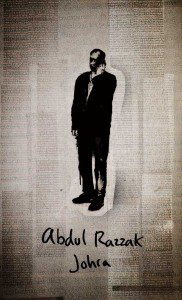3 Nov 2011 | Middle East and North Africa, News and features
 Index on Censorship and six other international rights groups call for the five activists known as the UAE 5 to be released from detention and the charges against them to be dropped (more…)
Index on Censorship and six other international rights groups call for the five activists known as the UAE 5 to be released from detention and the charges against them to be dropped (more…)
3 Nov 2011 | News and features

Murdered 3 November 2008
Reporter, Royal TV – Punjab, Pakistan
Join us in demanding justice for Abdul Razzak Johra, 45, dragged by six armed men from his home in the Mianwali district of Punjab, Pakistan on 3 November 2008 and shot — a day after his TV report on local drug trafficking was aired nationally. Colleagues said Johra had received threats telling him to stop covering the issue. Police acknowledged the killing but took no evident steps to investigate. In 2011, the tragic toll of dead and injured journalists and media workers placed Pakistan ahead of Iraq and Mexico as the world’s most dangerous country for reporters and media professionals.
Take action and send a letter to the authorities demanding an immediate and open investigation into this case here
International Day to End Impunity is on 23 November. Until that date, we will reveal a story each day of a journalist, writer or free expression advocate who was killed in the line of duty.
2 Nov 2011 | Egypt, Middle East and North Africa
Prolific Egyptian blogger Alaa Abdel Fattah was detained on Sunday after refusing to be interrogated by a military investigator, insisting on his right to be tried before a civil court. Rasha Abdulla reports
Egyptian blogger Alaa Abdel Fattah (@alaa) was jailed on 30 October for 15 days pending investigation after refusing to be interrogated by a military investigator on charges related to the now infamous Maspiro events, in which over 20 people died and many more were injured after a brutal crackdown on a Christian-majority demonstration.
Alaa was called in for investigation last week. He was active in the aftermath of the event, having spent two days at the morgue alongside other activists in solidarity with victims’ families, while trying to convince them to agree to autopsies and ensure the reports of said autopsies were correctly documented. He detailed the experience in a piece for Al Shorouk newspaper (a translation of which can be found here), in which he reminded everyone that solidarity is the solution to Egypt’s problems. Alaa has been detained before, in 2006 he spent 45 days in jail, a piece he wrote from behind bars was published today entitled “A Return to Mubarak’s Jails.”
Alaa was in San Francisco when he was asked to report last week. His father, veteran human rights lawyer Ahmed Seif El Islam Abdel Fattah, appeared in court and asked for the case to be postponed. Alaa returned to Cairo on Saturday afternoon and appeared in court on Sunday morning. The military prosecutor filed five charges against him including demonstrating, inciting to demonstrate, assaulting military personnel, destroying public property, and stealing military weapons. Alaa, whose sister Mona Seif (@monasosh) is one of the founders of the No to Military Trials for Civilians campaign refused to recognise the authority of an civic judge. He pointed out that the army is facing law suits accusing it as a defendant in the same case, which constitutes a clear conflict of interest. As a result he was detained, pending further military investigation.
Alaa has been active on the blogging scene in Egypt since 2004, when he and his wife Manal Hassan (@manal) started the award-winner blog and aggregator Manal and Alaa’s Bit Bucket. Both bloggers fought the Mubarak regime online and offline, breaking cases of corruption and police brutality that were later picked up by the traditional media.
Many believe Alaa’s detention is a warning to other bloggers and political activists, a ratcheting up of the series of violations against free expression committed by Egypt’s ruling Supreme Council of Armed Forces (SCAF). The violations include summons sent to journalists Rasha Azab (@rashapress) and her editor, Adel Hammouda, over Azab’s coverage of a meeting between the No to Military Trials group and SCAF in which allegations that SCAF subjected female demonstrators to virginity tests were discussed. Later, when journalist and blogger Hossam El Hamalawy discussed SCAF on a popular Egyptian talk show, he and his show host, Reem Magued, were both called in before the military prosecutor. That visit was later described by the prosecutor as “a chat.” Other bloggers that have been interrogated and/or detained including Asmaa Mahfouz, Loai Nagati, and Maikel Nabil, who has been on a hunger strike since 22 August.
A military court sentenced Maikel Nabil to three years for “insulting the military & spreading false reports aiming to disturb public security.” The charges relate to a May blog entitled “The army and the people are not one hand,” in which he listed the army’s alleged wrongdoings, including the virginity tests claim. Maikel, who has a heart condition, was tried 12 days after being arrested on 28 March.
Other free expression violations have been committed on the satellite television front. In recent months, army police forces have raided the offices of Al Jazeera Mubasher Misr several times, as well as 25TV channel. Al Jazeera Mubasher has since been banned from broadcasting from Egypt, accused of incomplete licensing procedures. Most recently, popular television host Yosri Fouda chose to indefinitely suspend his highly-viewed political talk show because he felt he was under pressure to not report things as he sees them and did not want to force himself through “self-censorship.” He told the BBC that he did not want to “take the narrative of the army” and would rather step back in protest of the military rulers’ attempts to “stifle free expression.”
The No to Military Trials campaign, which has been actively lobbying on behalf of all military detainees, has published a press release condemning Alaa’s arrest in the strongest possible words, and asking for his immediate release, together with the other 12,000 victims of military trials in Egypt, who should at least be retried before a civil court. The group called upon Egyptians to refuse to cooperate with military interrogation and to support the cause of No to Military Trials for Civilians. You can read the press release in its entirety here. A press conference by the group is scheduled for tomorrow, 3 November, at 2pm Cairo time.
Rasha Abdulla is an associate professor at the Journalism and Mass Communication Department of the American University in Cairo. An advocate for freedom of expression, Abdulla has published several books and writings on Internet use and digital activism in Egypt and throughout the Arab World. You can follow her on Twitter:@RashaAbdulla
2 Nov 2011 | Middle East and North Africa, Uncategorized
 Former IDF soldier Anat Kamm’s 4.5 year prison sentence shows the contradictions of Israel’s attitude towards leaks. Elizabeth Tsurkov reports
Former IDF soldier Anat Kamm’s 4.5 year prison sentence shows the contradictions of Israel’s attitude towards leaks. Elizabeth Tsurkov reports
When the Tel Aviv District Court sentenced Anat Kamm to four-and-a-half years in prison for leaking classified documents she obtained during her IDF service to the daily Haaretz, few Israelis were bothered. And no wonder, as Kamm was branded as a traitor and a spy by the security establishment, and most pundits since the gag order on her case had been lifted in April 2010. Most of the Israeli public didn’t seem concerned about the consequences this sentence will have on press freedom in Israel, but this lack of concern doesn’t make the repercussions of this sentence any less real.
Journalists rely on leaks and sources willing to talk to them and share information, which at times are obtained illegally and is disclosed without permission. The Israeli press is strewn with leaks, most of which are the product of political fights and bickering, and their purpose is to harm political rivals, not scrutinise the security establishment.
For example, in late 2006, Prime Minister Olmert attacked his Defence Minister Peretz for a phone call he had with Palestinian Authority President Abbas without informing Olmert himself.The attack revealed top secret information, namely that Israel wiretaps the phones of Abbas.
The Kamm verdict stated that it wasn’t necessary for the prosecution to prove harm was done to Israel’s security as a result of the leak, and the mere possibility of such harm was enough to convict Kamm. Judging by this standard, Olmert’s leak of highly sensitive information solely for political purposes was surely harmful Israel’s security.
Other common forms of leaks in the country are authorised declassifications by security services or leaks by government officials, which are intended to serve the political goals of the state of Israel. The occasional leaks by unnamed Israeli government official about the country’s intentions to attack Iran’s nuclear facilities are an example for such calculated moves, which are intended to spur the international community into action against Iran. Both these forms of leaks, the ones caused by political infighting and the calculated declassification, under the appearance of free press, are intended to serve the establishment, or at least the parts of it that leaked the information. These leaks provide a one-sided view of reality, according to the interests of the leaking party, and rarely serve any oversight capacity.
Israeli media rarely reports critically on the IDF, let alone other security organs, partly out of misplaced patriotism, but also because Israeli media lacks sources that are willing to reveal information about wrongdoings of the country’s security establishment. Critical coverage and public accountability of the security services are all the more necessary considering the little oversight the Knesset has over the security establishment due to issues of security clearances, and the culture of impunity that pervades Israel’s security organs.
Several of the documents Kamm provided to Haaretz reporter Uri Blau showed the IDF was still carrying out targeted assassinations of Palestinians suspected of terrorist activity when their capture was possible, against the explicit ruling of the Supreme Court. The officers who ordered and approved this illegal policy were not charged by the Attorney General. Instead, Israel’s justice system chose to punish a person who attempted to fight the IDF’s culture of impunity and disregard for the law.
Elizabeth Tsurkov is an Israeli writer and a contributor to +972 Magazine and Global Voices Online. You can follow her on Twitter: @elizrael.
 Index on Censorship and six other international rights groups call for the five activists known as the UAE 5 to be released from detention and the charges against them to be dropped (more…)
Index on Censorship and six other international rights groups call for the five activists known as the UAE 5 to be released from detention and the charges against them to be dropped (more…)

 Former IDF soldier Anat Kamm’s 4.5 year prison sentence shows the contradictions of Israel’s attitude towards leaks. Elizabeth Tsurkov reports
Former IDF soldier Anat Kamm’s 4.5 year prison sentence shows the contradictions of Israel’s attitude towards leaks. Elizabeth Tsurkov reports